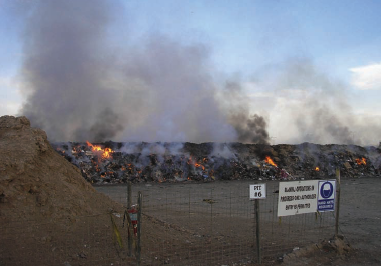The U.S. military is on a tear about how green it’s getting — bio fuels for jets, solar panels to cut down on fuel needed for generators, all that kind of stuff. Heck, even we’ve written about it. Hate to spoil the party, but after nine years of war, the U.S. military is still burning gobs of garbage in more than 250 open pits in Afghanistan and Iraq. U.S. troops are breathing in noxious fumes as prohibited trash like plastics continues to be burned. A Government Accountability Office report released Friday notes:
Burn pits help base commanders manage waste, but also produce smoke and harmful emissions that military and other health professionals believe may result in acute and chronic health effects to those exposed. Some veterans returning from both conflicts have reported pulmonary and respiratory ailments, among other health concerns, that they attribute to burn pit emissions. Numerous veterans have also filed lawsuits against a DOD contractor alleging that the contractor mismanaged burn pit operations at several installations in both conflicts, resulting in exposure to harmful smoke that caused these adverse health effects.

Burn pit at Camp Taji, Iraq / GAO
The wars generate about 10 pounds of waste per day per soldier — some 500 tons daily in Afghanistan, and half that in Iraq — consisting of “plastic, Styrofoam, and food from dining facilities; discarded electronics; shipping materials such as wooden pallets and plastic wrap; appliances; and other items such as mattresses, clothing, tires, metal containers, and furniture.” That’s a lot of stuff to burn. Thankfully, the U.S. military “plans to increase recycling at its bases in Iraq,” the report notes, “but recycling at bases in Afghanistan has been limited.” The GAO blames what it terms “the constraints of combat operations” for some of the problem.


